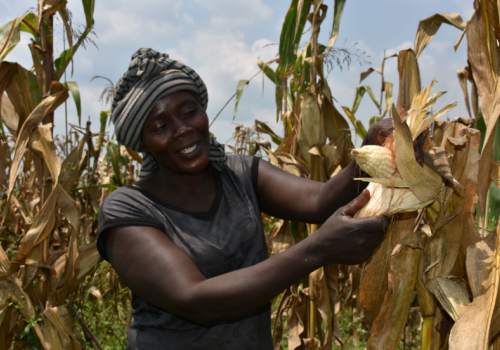The National Agriculture Research Organisation (NARO) is collaborating with the International Institute of Tropical Agriculture (IITA) to develop Aflasafe, a natural product that's essential in the management of aflatoxin in the maize, sorghum, and groundnut value chains.
The four-year project is funded by aBi Development Ltd. (aBi) and is aimed at reducing aflatoxin contamination in the above crops so they are safe for consumption.
The project, which was launched on August 12, is also expected to help Uganda boost its export market.
Aflatoxin also causes a loss in revenue in the markets due to contaminated products. Uganda loses an estimated US$38 million annually in lost export opportunities because of aflatoxin. In 2018, Kenya rejected 600,000 tons of maize from Uganda, equivalent to Shs180 billion owing to poor quality and aflatoxin contamination.
Aflatoxin is a highly poisonous cancer-causing chemical produced by a fungus known as Aspergillus flavus that attacks crops such as maize and groundnut while in the field and in storage when they are not dried and stored properly.
Aflatoxin also lowers the body’s immunity and causes permanent and irreversible stunting in children and, in cases of acute poisoning, can lead to instant death.
An estimated 3,700 liver cancer cases reported in the country annually are attributable to aflatoxin contamination.
This translates to between US$144.3 and 577.2 million, or 0.53–2.14% of Uganda’s total GDP. A 2014 study revealed high levels of exposure of Ugandans to aflatoxin.
All adults (100%) who participated in the study had aflatoxin (average of 11.5 pg/mg) in their blood, while for children, 95.8% had detectable aflatoxin with an average level of 9.7 pg/mg.
“Aflatoxin is a major challenge to the country’s efforts towards food self-sufficiency. It is a top priority in Uganda and the government has flagged it in the Agriculture Sector Development Plan. Therefore, minimizing aflatoxin contamination would have tremendous economic and health benefits to Uganda,” said Dr Godfrey Asea, Director of the National Crops Resources Research Institute (NaCRRI) during the launch held at NARO Uganda.
Aflasafe is a very effective natural product for minimizing aflatoxin contamination. It is made up of strains of A. flavus that do not produce the poison and are coated on sterile sorghum grains. When applied in the field at the right time, it is able to displace toxin-producing Aspergillus strains, thereby reducing aflatoxins and making the crops safe.
Efforts to develop the Uganda-specific Aflasafe started in 2013 under the Aflatoxin Policy and Program for East Africa (APPEAR) project that was funded by USAID. It led to the identification of effective strains of A. flavus to be used to develop the biocontrol product.
“We are grateful to aBi and Alliance for a Green Revolution in Africa (AGRA) for their support, which will enable us to build on past efforts and finalize the development of an Aflasafe product for Uganda," said George Mahuku, the project manager at IITA.
"The funding from this project will support field trials on the efficacy of the selected strains in reducing aflatoxin contamination and identify the most effective combinations to form Aflasafe that will be officially released in the country. We will also conduct communication and awareness activities for the population, which is also key to an aflatoxin-free Uganda.”
The APPEAR project also provided information on the major maize, groundnut, and sorghum regions that would help to implement the aBi-funded project.
Other project partners include the Ministry of Agriculture, Animal Industry and Fisheries (MAAIF), Ministry of Trade, Industry and Cooperatives (MTIC), Ministry of Health (MoH), East Africa Grain Council (EAGC), Grain Council of Uganda (TGCU), Makerere University, and from the development sector, AGRA and aBi.
Through this initiative, Uganda will join Kenya and Tanzania, which have their country-specific Aflasafe products fully registered and are now commercially available.
